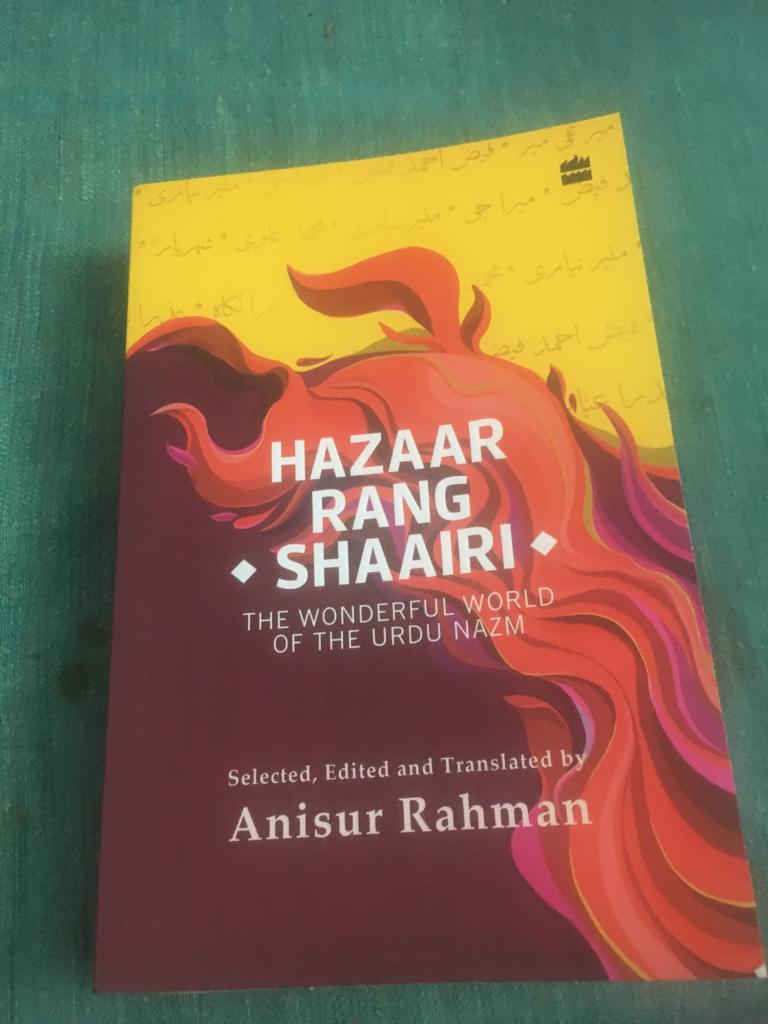
Hazaar Rang Shaairi is Anisur Rahman’s second major work focusing on the nazms. He had earlier in 1995, published his book on nazms titled- Fire and the Rose, where he focused on modern Urdu nazm, translating the verse of forty-five poets from 1930s to 1980s. And in this latest volume, he has expanded the range, bringing to the fore, many more verses of many more poets of the passed-by centuries.
A book review by Humra Quraishi
Title of the book –Hazaar Rang Shaairi
Publisher – Harper Collins
Selected, Edited and Translated by – Anisur Rahman
Pages – 522
Price – Rs 699
This book is indeed laden, or shall we say loaded, with the best of Urdu poetry. Selected, edited and translated by the well-known literary personality, Anisur Rahman, this volume stands out. Tucked in are 140 nazms, from the sixteenth century to the present times…Poets and their verse from the Deccan region to the Northern states and regions.
This is Anisur Rahman’s second major work focusing on the nazms. He had earlier in 1995, published his book on nazms titled- Fire and the Rose, where he focused on modern Urdu nazm, translating the verse of forty-five poets from 1930s to 1980s.
And in this latest volume, Anisur Rahman has expanded the range, bringing to the fore, many more verses of many more poets of the passed-by centuries. To quote him on the various aspects to this volume: “The poets represented in this volume are divided into six literary periods as I conceived them for the convenience of the readers…I have tried to make this collection fairly representative of ages, poets, forms, styles and thematic concerns.”
Credit goes to him for putting together this diverse selection of nazms in their translated form, and also taking pains to explain to the reader the various details and backgrounders and the relevant significance to the nazm. To quote him from this volume, “Nazm is a Arabic word which, as a noun, means arrangement, and as a verb, it implies, an act of stringing together, maybe of beads or pearls. Nazm also means verse, or poetry, which interestingly enough, is also born out of an act of stringing, not of beads or pearls but of words. Metaphorically speaking, words are the beads or pearls, which the poet strings together in the larger body of a poem, in the many ways and forms as desired.”
With that take off, tucked in the volume are the nazms of Vali Deccani, Mohammad Quli Qutub Shah, Mir Taqi Mir, Mohammad Iqbal, Kaifi Azmi, Ali Sardar Jafri, Sahir Ludhianvi, Shahryar, Balraj Komal, Nida Fazli, Sarwat Hussain and many other poets.
Leaving you with this verse, of Nida Fazli, titled ‘Identification’, tucked in this volume:
Identification
(For Hajira Begum, whose four children were burnt alive by rioters in Jalgaon)
‘No, not he,/
Not he,/
Not even he – /
I don’t know who they were – /
All these are like me, /
Little moons twinkle in their heartbeat,/
All these are like me, the fuel of time’s furnace/
Those who broke into my hut last night and burnt my children/
Alive before me,/
Were some others – /
Those faces are no longer in my memory, Your Honour! /
But if they were close by/
I would know them by their smell – /
They had come from a jungle/
Where women don’t bear any children/
Their laps don’t twinkle/
With the smiles of infants.’












